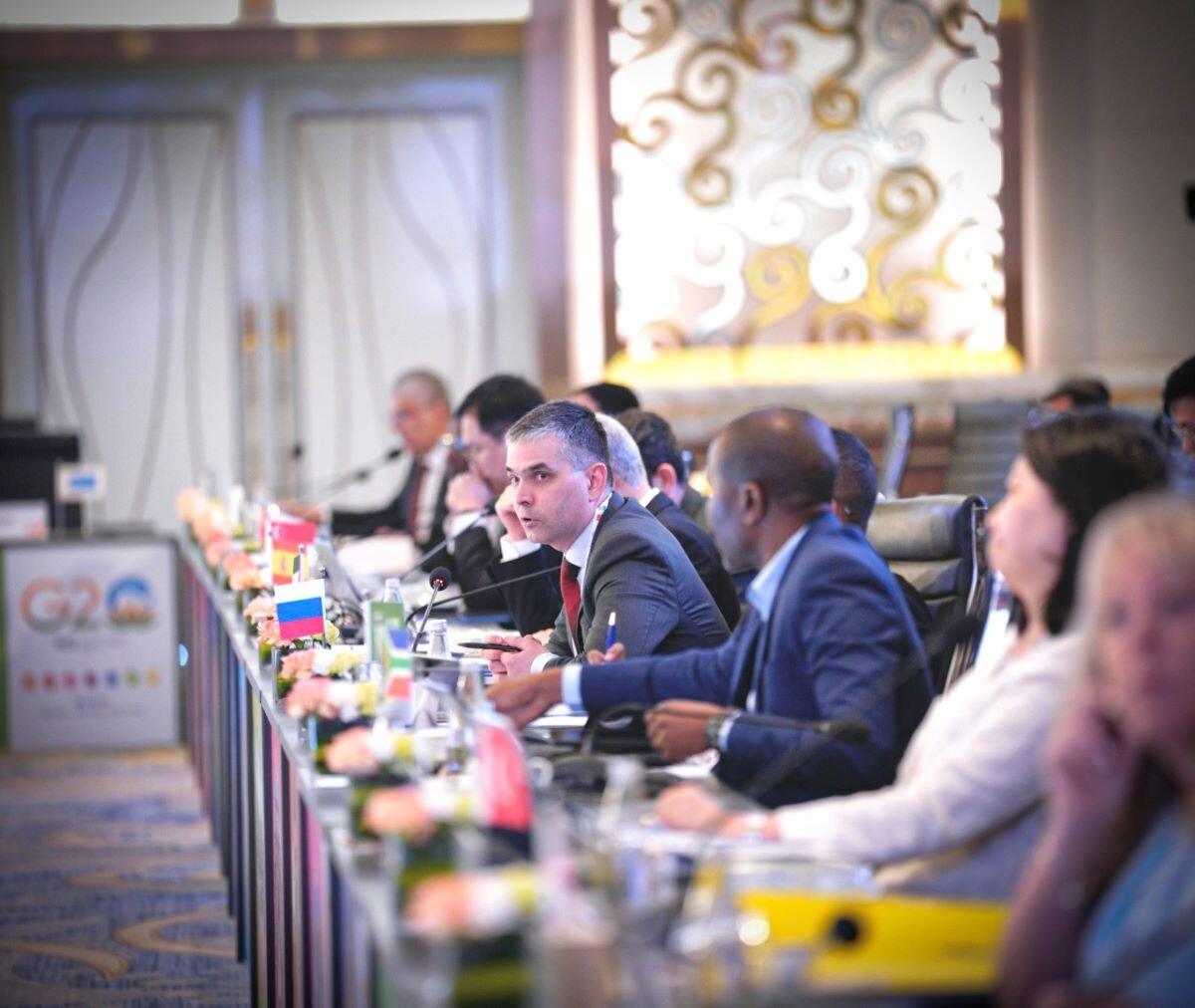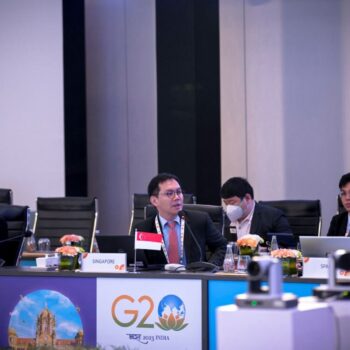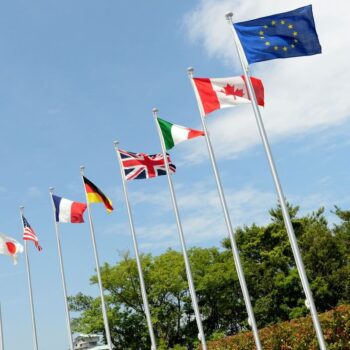- As G20 President, India has the opportunity to drive a progressive energy transition that boosts energy security and economic growth, supporting the new generation of digitalised, flexible, resilient, and equitable energy systems.
- The G20 hold the key to 1.5°C: covering 88% of the remaining proposals for new coal power capacity and accounting for 73% and 77% of global gas and oil demand respectively. Their commitment to accelerate the phase-down of all fossil fuels makes all the difference.
- Placing this alongside a commitment to collaborate for increased renewables capacity and a reduction in global energy waste would send a signal of growth to global markets in turmoil.
India’s G20 Energy Ministerial
As a voice from the Global South, India has championed equitable and fast-tracked actions needed this decade to meet both development and climate goals. India has championed accelerating renewables deployment by setting up the International Solar Alliance (ISA) with France, highlighting the importance of disaster risk reduction at the G20 by setting up the Coalition for Disaster Resilient Infrastructure, and advocating for a higher climate finance target and transition support for developing countries at COP27.
Clear ministerial outcomes for action can restore trust in the forum by ironing out disagreements that have been hindering progress and setting up positive outcomes at COP28.
Alden Meyer, E3G Senior Associate, said:
“G20 energy ministers should embrace the transformational actions needed to accelerate the transition to clean energy, not just to meet the Paris temperature limitation goals but to strengthen energy security and sustainable development.
Ministers must avoid any backsliding from their agreement last year in Bali on the need to accelerate the phase-down of unabated coal-fired power generation.”
Madhura Joshi, Senior Associate at E3G, said:
“The latest IRENA report projects that 50% of G20 electricity will need to come from solar and wind by 2030.
The thriving renewables market will soon overtake coal as the biggest source of electricity generation. As the conversation about fossil fuel phase-down grows in strength, we need more ambition on renewables. G20 countries are mostly already moving towards a cleaner electricity system, but this now needs to be accelerated.
India’s efforts as G20 President to raise the world’s largest economies’ ambitions to scale up solar and wind power are critical to ensuring equitable and affordable growth and accelerating the momentum to a resilient clean energy future for all.”
Alden Meyer, Senior Associate (multilateral climate and clean energy diplomacy, mitigation ambition, US policy & politics)
m: +1-202-378-8619, alden.meyer@e3g.org
Madhura Joshi, Senior Associate, E3G (Indian geopolitics and policy, energy transition)
m: +91 9650783893 madhura.joshi@e3g.org
New generation energy systems
The G20 needs to acknowledge its role in accelerating renewable energy deployment – and with that recognise its share in the deployment and financing gap, and call for actions to resolve it. It is crucial for G20 nations to recognise how decentralised renewable and demand-side solutions support energy access, open economic opportunities, and foster transitions.
Annisa Sekaringtias, E3G Senior Researcher, said:
“Energy ministers need to show leadership with a more ambitious framing of the energy transition. With the rapid increase and change in energy demand, and ever more extreme weather events, successfully managing the transition is now key to achieving energy security, economic growth, and climate resilience.
The G20 should signal a vision for the new generation of energy systems. One that is modernised, digitalised, flexible, resilient, and equitable. They can do this by further leveraging the role of distributed renewables, grids, and digitalisation, alongside committing to double the G20 energy efficiency rate and further endorsing a global efficiency and renewable target, to be agreed by COP28.”
Annisa Sekaringtias, Senior Researcher (climate neutral energy systems) annisa.sekaringtias@e3g.org
Fossil fuels
Building on last year’s G20 agreement on fossil fuels, India’s G20 needs to continue avoiding stranded assets from all fossil fuels, by agreeing to accelerate the phase-down of all fossil fuels, and end construction of new unabated coal-fired power plants.
Maria Pastukhova, E3G Senior Policy Advisor, said:
“Accelerated and structural phase-down of fossil fuels over the next decade, and a phase-out of all unabated fossil fuels before 2050, is essential for the global economy to stay on a 1.5°C climate trajectory. Many major economies are calling for action, including the EU and its member states, the G7, and the United Arab Emirates via its COP28 presidency.
G20 countries are responsible for roughly three-quarters of global oil and gas demand. As the world’s largest economies, the G20 must take the leadership baton and commit to enabling the global transition to fossil-free energy systems. As a first step, the G20 can show tracked progress on the long overdue phase-out of fossil fuel subsidies.”
Anusha Mata, E3G Senior Policy Advisor, said:
“Coal, the most polluting energy source, is on its way out. For the first time ever, the total scale of coal power under consideration has fallen below 100 GW in the world outside China (96.7 GW). But we need to move faster – G20 countries are currently home to 88% of the remaining global proposals for new coal power capacity.
A strong G20 signal on ending new unabated coal and phasing out unabated fossil fuels under India’s Presidency would cement India’s global climate leadership. It would provide a strong market cue for renewable expansion and drive momentum for a global agreement on no new coal and fossil fuel phase-out at COP28.”
Anusha Mata, E3G Senior Policy Advisor (fossil fuel transition, coal phase-out)
m: +44 (0)7817 560 411, anusha.mata@e3g.org
Maria Pastukhova, Senior Policy Advisor (energy, gas)
m: +49 (0) 157 779 195 58, maria.pastukhova@e3g.org
Notes to Editors
- E3G is an independent climate change think tank with a global outlook. We work on the frontier of the climate landscape, tackling the barriers and advancing the solutions to a safe climate. Our goal is to translate climate politics, economics and policies into action. About – E3G
- For further enquiries email press@e3g.org or phone +44 (0)7783 787 863
- You can now receive the very latest news, developments and exclusive analysis via E3G’s WhatsApp broadcast for journalists. Sign up here.


